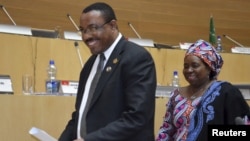ADDIS ABABA —
The African Union summit ended Monday night with a commitment to play a leading role in solving problems on the continent instead of waiting for other nations to lead the way.
Conflicts on the continent, economic integration and the AU's 50th anniversary dominated the two-day summit. The general assembly of the pan-African organization concluded with initiatives and pledges to lead the way in solving problems on the continent, such as the militant takeover of northern Mali.
The French were the first to attack the groups that imposed strict Islamic law on the region. A West African-led mission to Mali was in the planning for months but deployed only after the French intervened.
The AU's new chairman, Ethiopian Prime Minister Hailemariam Desalegn, said in his closing remarks Monday night that the General Assembly pledges to help stabilize Mali.
“In this regard the assembly, among others, has adopted a declaration reaffirming its solidarity with Mali and expressing the determination to pull the efforts of member states,” he said.
The African Union will contribute $50 million to support AFISMA, the African-led International Support Mission to Mali. A donor conference will be held at the African Union on Tuesday to collect the additional $460 million needed for the mission.
The continent also faces conflicts in the Central African Republic, the Democratic Republic of Congo and tense situations in Guinea-Bissau and the Sudans.
The AU says it aims to make its proposed African Standby Force fully operational as soon as possible, so it can respond more quickly to emerging conflicts.
AU members also acknowlege there is a need for efforts to improve economic growth, as much of the African development budget still comes from international partners. Hailemariam says a key element of that will be NEPAD, the New Partnership for Africa’s Development program.
“We have exchanged views and agreed on ways and means of addressing our financial constraints and agreed on the need to find innovative ways of mobilizing domestic resources to finance the implementation of NEPAD programs,” he said.
Hailemariam says the contribution toward Mali and the NEPAD initiative are examples of Africa trying to overcome its own problems instead of waiting for the other countries to help.
To expand on that effort, Liberia’s President Ellen Johnson Sirleaf will lead committee of heads of states to map out the development agenda for the continent.
African heads of state will gather in Ethiopia again in May to celebrate the 50 year anniversary of the AU. The theme of the celebrations will be pan-Africanism and African renaissance.
Conflicts on the continent, economic integration and the AU's 50th anniversary dominated the two-day summit. The general assembly of the pan-African organization concluded with initiatives and pledges to lead the way in solving problems on the continent, such as the militant takeover of northern Mali.
The French were the first to attack the groups that imposed strict Islamic law on the region. A West African-led mission to Mali was in the planning for months but deployed only after the French intervened.
The AU's new chairman, Ethiopian Prime Minister Hailemariam Desalegn, said in his closing remarks Monday night that the General Assembly pledges to help stabilize Mali.
“In this regard the assembly, among others, has adopted a declaration reaffirming its solidarity with Mali and expressing the determination to pull the efforts of member states,” he said.
The African Union will contribute $50 million to support AFISMA, the African-led International Support Mission to Mali. A donor conference will be held at the African Union on Tuesday to collect the additional $460 million needed for the mission.
The continent also faces conflicts in the Central African Republic, the Democratic Republic of Congo and tense situations in Guinea-Bissau and the Sudans.
The AU says it aims to make its proposed African Standby Force fully operational as soon as possible, so it can respond more quickly to emerging conflicts.
AU members also acknowlege there is a need for efforts to improve economic growth, as much of the African development budget still comes from international partners. Hailemariam says a key element of that will be NEPAD, the New Partnership for Africa’s Development program.
“We have exchanged views and agreed on ways and means of addressing our financial constraints and agreed on the need to find innovative ways of mobilizing domestic resources to finance the implementation of NEPAD programs,” he said.
Hailemariam says the contribution toward Mali and the NEPAD initiative are examples of Africa trying to overcome its own problems instead of waiting for the other countries to help.
To expand on that effort, Liberia’s President Ellen Johnson Sirleaf will lead committee of heads of states to map out the development agenda for the continent.
African heads of state will gather in Ethiopia again in May to celebrate the 50 year anniversary of the AU. The theme of the celebrations will be pan-Africanism and African renaissance.




